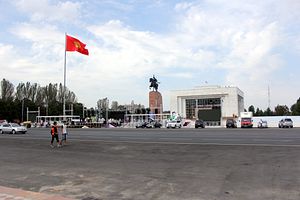Kyrgyz President Almazbek Atambayev kicked the year off with a quick trip to Beijing which began on January 6 and by January 9 had morphed into a vacation with his family. The visit was lauded in Chinese government press releases as marking the 25th anniversary of relations between the two states and underlying the strong bilateral relationship.
“China and Kyrgyzstan have truly become good friends, good neighbors and good partners,” a Foreign Ministry report commented.
Kyrgyzstan is one of China’s smallest neighbors, both economically and geographically, but the two states see great value in spurring the growth of their relationship. The Chinese border with Kyrgyzstan may be only 533 miles long, but it’s one of China’s gateways to Central Asia and a node on the amorphous but undeniable Belt Beijing is working on from China to Europe.
The Kyrgyz see in China a partner and potential investor, to both complement and perhaps balance, Russia. In early 2016, Kyrgyzstan terminated an agreement in which Russia was to finance the construction of various hydropower projects. To put it simply, the Russians weren’t able to make good on the financing and the Kyrgyz needed to move on. Reports surfaced last spring that the Chinese would be taking up the projects and in the fall, Akipress reported that companies from five countries were interested in implementing the project on the Naryn river. At this point, however, it’s not quite clear if the project has investors yet. China would seem to be the logical option, but Beijing may not bite.
The Chinese see in Kyrgyzstan a connection on the Belt, a customer for its companies, a venue for its merchants, and a partner in managing the threat of terrorism across what once was known as Turkestan — stretching from Tibet to the Caspian Sea. The suicide bombing targeting the Chinese Embassy in Bishkek in late August 2016 did not put counterterrorism on the bilateral agenda — it was already there — but it did refocus cooperation between the two with regard to what’s known in Chinese diplospeak as the “three evils,” namely terrorism, separatism, and extremism.
The embassy bombing was surprising, but inept. There were no deaths, aside from the bomber, and only three Kyrgyz were injured. Four months later both Beijing and Bishkek remain serious in the narrative that the bomber was part of a larger plot.
Atambayev discussed the issue with Chinese President Xi Jinping. According to Chinese state media, the two “vowed to deepen security cooperation and jointly fight terrorist forces such as the East Turkistan Islamic Movement.”
In Istanbul, the Chinese and Kyrgyz Ambassadors to Turkey met and announced that suspects related to the August embassy bombing were hiding out in Istanbul. 24.kg reports that the meeting with organized by the Chinese side, and they they discussed the recent terrorist attacks in Istanbul — particularly the New Years nightclub attack in which a Kyrgyz man was among the initial suspects (after a pair of men or a single man dressed as Santa Claus). The Kyrgyz suspect has been cleared, given the fact he wasn’t even in Turkey the night of the attack. Turkish police now say the attacker was an Uzbek militant with the same last name.
How precisely Kyrgyzstan and China plan to deepen their security cooperation is unclear. The two already cooperate via the Shanghai Cooperation Organization and Bishkek, in the past, has deported Uighurs upon request from Beijing. As Ryskeldi Satke depicts in a recent piece for Al Jazeera, Uighur communities in Central Asia are increasingly in an awkward position.
Although Atambayev’s trip to China was advertised by officials in Bishkek as short, the president apparently decided to stay for a vacation until January 14. He was criticized in Kyrgyz press for the vacation but administration officials stressed that vacation time is on the president’s dime, not Bishkek’s.

































